Dominic Calvert-Lewin: “With Rom leaving I knew there was going to be an opportunity... now it's down to me”
Life moves at a fast pace for the 20-year-old forward: in 2017 alone he's managed to break into Everton's first team, spearheaded international success with England and now has eyes on impressing new club boss Sam Allardyce. Not that he's fazed, mind...
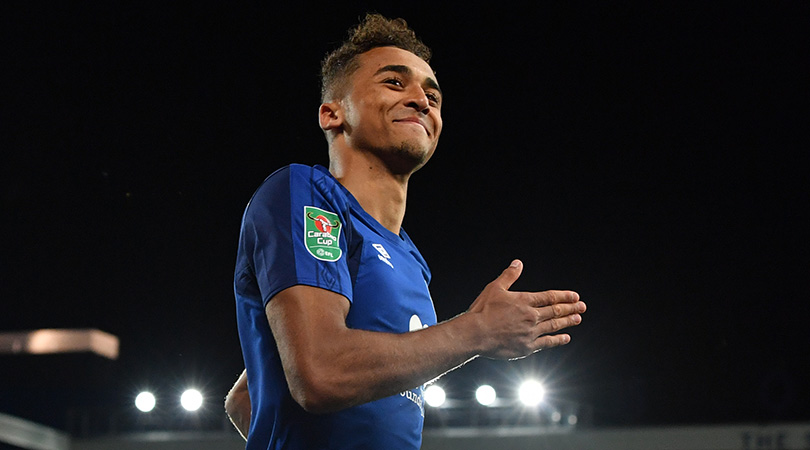
Dominic Calvert-Lewin takes a rare pause, giving his mind’s eye time to access the South Korea 2017 album. The corners of his mouth pull back, tugging his lips away from his teeth to reveal a smile. “There’s a few moments in my career that I’ve had so far that I could describe as unbelievable, and that would be one of them,” he says emphatically.
Yes, there have been plenty of ‘unbelievable moments’ for the youngster to celebrate in his embryonic career – playing for his boyhood team Sheffield United, signing for Everton and scoring in the Premier League are to name but a few – but hitting the winner in a World Cup final will take some beating.
“Cookie (Lewis Cook) had a deep free-kick and I was just screaming at him, ‘Just kick it in behind’ because their (Venezuela) backline was so high,” explains the Everton forward.
“I gambled with the header and it bounced down nicely for me – I had a shot and the keeper parried it. Everything just went in slow motion as I followed it in. The ball was bouncing and I was thinking, ‘It’s on your left foot, focus on the contact and just make sure you hit the target.’”
He did, striking the ball under Wuilker Faríñez to score the decisive goal against Venezuela in June’s Under-20 World Cup final in Suwon – giving England their most significant international title since 1966.
“I remember wheeling off to the corner flag again and all the boys jumping on my back,” he recalls with a smile. “I did about five celebrations in one as I ran off, but that goal meant a lot because it proved to me that I can compete at that level.”
New beginnings
Almost six months have passed since Calvert-Lewin made Three Lions history; now it’s time to show he has what it takes to deliver match-winning performances at Premier League level.
Get FourFourTwo Newsletter
The best features, fun and footballing quizzes, straight to your inbox every week.
Under new Everton boss Sam Allardyce, a manager with a liking for tall, sinewy strikers who lead the line, he'll be given the chance to prove that there’s no need to splash out on someone to fill the Romelu Lukaku shaped-hole in their attack.
That’s not easy, of course, but Calvert-Lewin has stood up to every challenge he’s faced on the pitch with grit and guile; whether engaging in close-quarter combat on the streets of Sheffield or taking hits in the non-league roughhouse.
Growing up in Hillsborough, Sheffield Wednesday heartland, he went against the grain by supporting crosstown enemy United, and relished the battles his club allegiance and innate talent would stir in the ultimate proving ground of a modern footballer: the cage.
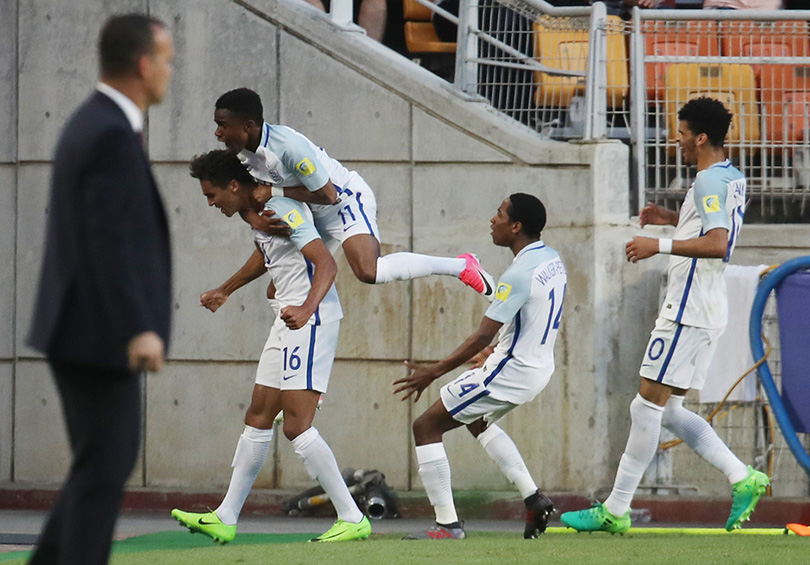
“As a kid I would go to Hillsborough Park and play football with my mates,” he tells FFT. “There was a concrete pitch with a cage and me and my mates would go there to play older kids, but we were decent so we’d always give them a good game.
“I remember getting smashed in the mouth a few times, but that was a time when you’d try your tricks and get a ‘Wow!’ from someone watching.
“When I first went up to secondary school, we would play against lads three years above us and I had a tooth knocked out during one game in the playground.”
Struggle of self-doubt
As with any topic Calvert-Lewin discusses, he does it with confidence and candour – a symptom of his adolescence. Senior pros, wary of providing a journalist with an assist for a sensationalist headline, usually park the bus. He, instead, chooses to flood forward. And it’s a joy to listen to.
The 20-year-old is not using this as an opportunity to boast about his machismo, more reliving the fond childhood memories that helped shape him as a footballer. Not all of these memories are positive, but they are no less important. In another refreshing show of honesty, he discusses his battle with nerves.
Insecurity – an emotion we civilians don’t expect uber-confident Premier League footballers to experience – has brought on tears, sickness and self-doubt. But even as a child, he showed the courage to overcome his fears and let his love for the game jolt his feet into action.
“I remember being really nervous playing football as a kid, having butterflies before the game, probably more than I do now,” he admits. “When you played as a kid, that’s when you had the least amount of pressure. As soon as the first whistle went I was nervous, but then I’d get my first touch and I’d play with freedom, enjoying the game like I do now.”
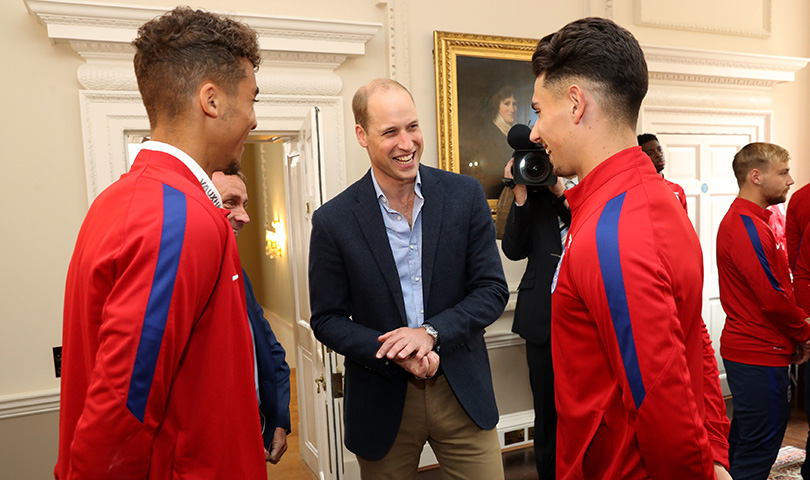
Nerves manifested themselves in shyness – a shyness that almost kept him under the radar of local scouts.
“Being nervous held me back,” admits Calvert-Lewin. “My dad took me to play for an under-sixes team and all the other kids were chasing the ball around.
“My dad said, ’Go on, get yourself off!” and I just jogged around on the outskirts not really wanting to get involved. I just started crying and turned to my dad. He said, ‘Come on, let’s go.’
“A year later I joined under-sevens at Handsworth Boys and remember playing in a national tournament at Butlins, in Skegness. The first day we were there I was sick in the middle of the night because I was that nervous to play. I scored four the next day.
“I continued to score goals for Handsworth and was training one Saturday when a Sheffield United academy coach walked over and said, ‘Is your name Dominic?’ I was like, ‘Yeah.’ He said, ‘Come with me.’
“That coach was Scott Sellars and that was it. I signed for Sheffield United.”
Striking potential
Inspired by academy graduates Kyle Walker and Kyle Naughton, who were impressing in the Championship, Calvert-Lewin progressed through the youth team ranks as a central midfielder, desperately chasing his dream.
With no clear pathway into the senior side, his coach made a decision that would change the course of Calvert-Lewin’s career.
“There were a lot of central midfielders in the first team at the time,” explains the boyhood Blade. “I’d played central midfield all my life and but my coach said, ‘You’re big, tall, fast, good on the ball and you can score goals so we’re going to try you up top.’”
“I scored a few goals for the under-18s and then he came to me and said, ‘We’ve sorted you a one-month loan over Christmas [2014] at Stalybridge in the Conference North – that’s the highest level we can get you at this moment in time.’ So I said, ‘Yeah, fine.’”
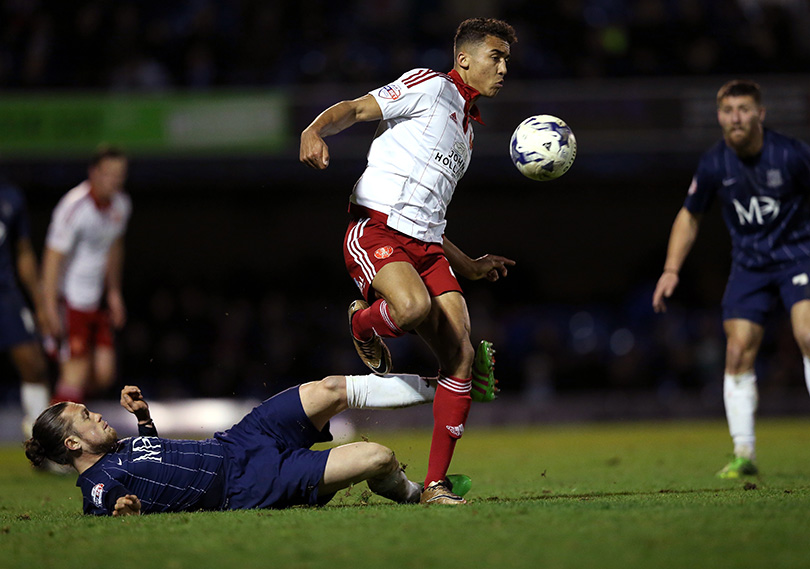
Unglamorous, rough and full of non-league players with a chip on their shoulder, this level of football would test the 17-year-old’s mettle.
Two days after signing he scored twice on his debut, in a 4–2 win at Hyde United. At the beginning of February 2015 he returned to his parent club with six goals in five appearances, a few bumps and bruises and another valuable learning experience under his belt.
“I got smashed in the face in the first 20 minutes of my debut and cut my eye,” he remembers with another irrepressible smile. “I was learning my craft – just like I am now. Because you play on terrible pitches the football isn’t really played out from the back – it’s more boot it up the pitch, spin it in behind and chase it.
“Playing competitive men’s football, with fans cheering for the team and putting myself in positions of stress at a young age, was vital. I didn’t know it at the time, but it was the most beneficial thing I could have done for myself. It seems crucial in getting me where I am now.”
Stuck on the Toffees
He had to wait two months before making his debut for Sheffield United’s first team, and by the end of the season had three first-team appearances to his name.
That summer he impressed during pre-season and looked set to establish himself as a first-team regular, but he was sent out on a loan again – this time to League Two Northampton Town. He scored eight goals in 26 appearances for the Cobblers before returning to Bramall Lane in January 2016.
Again, he simmered with promise on the cusp of the first team, but couldn’t quite earn the trust of manager Chris Wilder. It didn’t matter, though – one Premier League club had seen enough.
“I was sat round the table at my grandad’s house having a coffee with my family when my agent called,” explains the England under-21 international, his voice jumping with excitement.
“‘Everton is back on,’ he said. I was like, ‘Shut up! You’re lying!” He said, ‘No, seriously. They’ve come in again and it’s looking more serious this time.’ All my family were screaming, as you’d imagine.”
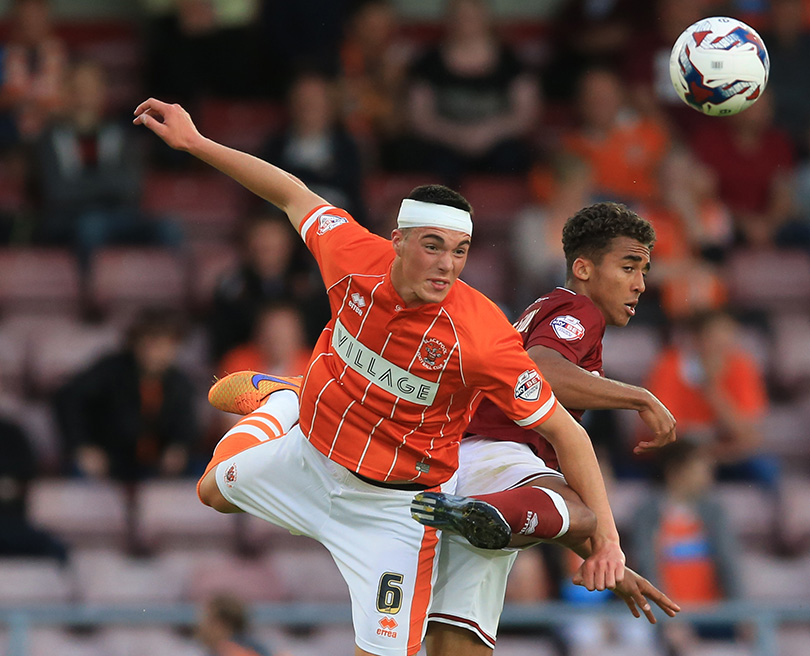
It was serious. Calvert-Lewin finally signed for the Merseyside giants in a deal worth £1.5 million in August 2016. Once again, he had to prove himself: what can a teenage striker, who was unable to hold down a starting position at a League One club, offer a major Premier League outfit? After one training session the youngster knew he had to raise his game.
“What made me go ‘Wow’ at first was the possession drills,” says Calvert-Lewin, as the smile retreats from his face for the first time in our interview. “No one really gave the ball away, it was just going ‘boof, boof, boof’ – pinging everywhere.
“Everyone’s on two-touch and you’re thinking, ‘When the ball comes to me I’ve got to know where it’s going next. You take your touch, pass it and think, ‘Yes, I kept the ball.’”
Stepping up
To survive at this level the new boy had to do more than just play it safe. He had to hold his head up, puff his chest out and show his team-mates that he had what it took to cut it at Premier League level.
“It takes a while to settle in and fully be yourself on and off the pitch, but once you realise you can cope with the standard you have to ask yourself, ‘Can I start doing that little bit extra?’”
And he did. After impressing with the under-23s he started to train regularly with the first team and made his Premier League debut against Arsenal in December 2016.
Calvert-Lewin was often deployed as a right-wing-back by former manager Ronald Koeman, but showed flashes of promise in a role he’s not accustomed to in 12 appearances (and even managed a goal).
Then came the summer. There was no time to reflect on a positive start at Goodison Park – he had a World Cup to win. Calvert-Lewin joined up with the under-20s in East Asia and embarked on a history-making campaign.
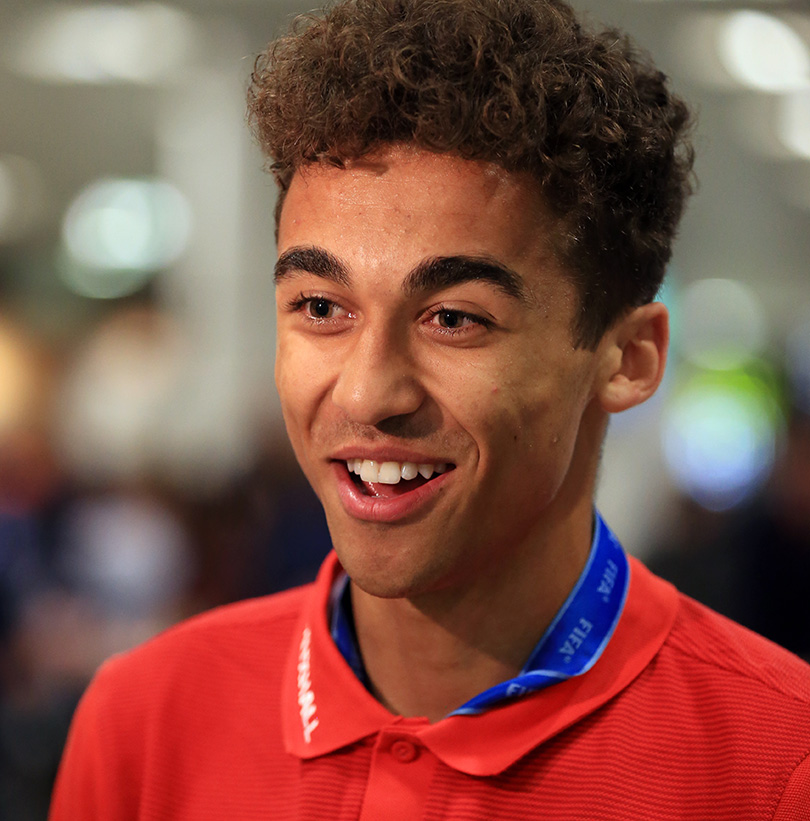
Paul Simpson’s squad, which contained five Everton players, were sensational in beating Argentina, hosts South Korea, Mexico and Italy on their way to the final.
That’s when things started to get serious. “I remember seeing tweets from David
Beckham and Gareth Southgate before the final,” recalls Calvert-Lewin. “You’re in a bubble during the tournament and don’t know what’s going on in England, but that’s when we realised, ‘Everyone knows we’re here now’ and we have to bring it home for them.”
They didn’t disappoint. Calvert-Lewin’s first-half winner won England their first global
title since the senior team’s World Cup victory 51 years ago.
“I found my family in the stands and hugged them. I remember thinking, ‘I’ve won the
World Cup here, just take it in,’” he reminisces.
When rivals come together
It was a special triumph for him which forged a special bond, not only with his club-mates but rivals from other clubs – a bond that could serve the nation well at future tournaments.
“When you go on international duty, you’ve got boys from London, Newcastle, Liverpool, Sheffield – all over – so it doesn’t necessarily mean you’re going to be close mates,” he says.
“But at that tournament we became a unit and we all got along – that helped tremendously with how we played as a team and going on to win it. We share a special bond after going through that experience and I would go as far to say we’re all mates.
“We know how it feels to play in a big, high-pressured tournament and win it, and now a lot of us are playing together in the 21s.
“If I ever go on to play in another World Cup final, I’ll be able to draw on that experience and get in the right mental state.”
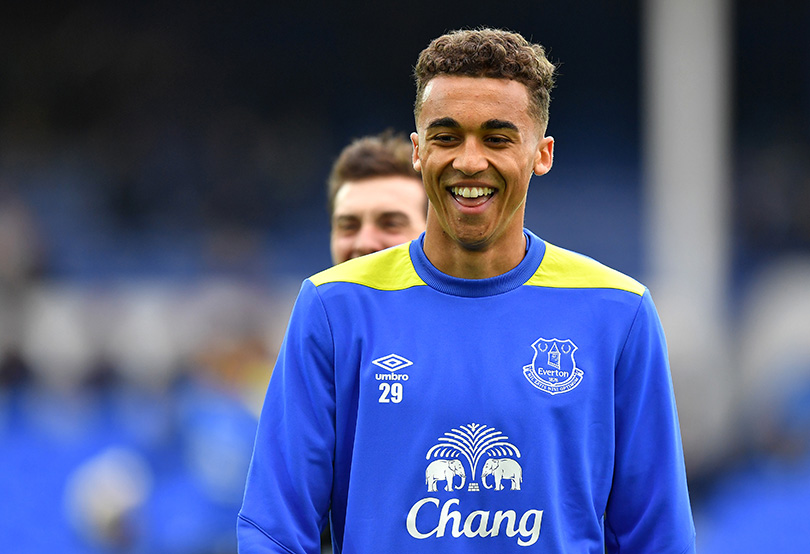
This account of a unified England team offers an encouraging departure from the culture of debilitating club-based cliques that affected England’s Golden Generation between 2002 and 2008.
Current England manager Gareth Southgate is looking to capitalise on this solidarity and confidence, placing faith in youth, having called up Dominic Solanke and Lewis Cook – two of the victorious under-20 bunch – for the recent friendly against Brazil.
Calvert-Lewin wants to be next.
“Someone like me can only take confidence from that – I know the opportunity is there,” he says. “First and foremost you have to look at your club form, and if I can score goals for Everton then I’ll have an eye on the England team.”
Filling the void
He hoped to do that this season after their top goalscorer for the last four seasons, Lukaku, joined Manchester United in the summer for £75 million. Former Everton manager Ronald Koeman spent his transfer kitty swiftly – parting ways with almost £150 million.
Lukaku wasn’t replaced, but Calvert-Lewin wasn’t entrusted with leading the line either – he was instead stationed out wide, as Koeman tried to find space for his newly assembled cadre of playmakers: namely Wayne Rooney, Davy Klaassen and Gylfi Sigurdsson.
Koeman couldn’t find the right formula. Everton found themselves in the bottom three and the Dutchman found himself without a job, getting sacked in October having won just two of nine Premier League games. Under-23 coach David Unsworth was placed in temporary charge and won two of his eight matches.
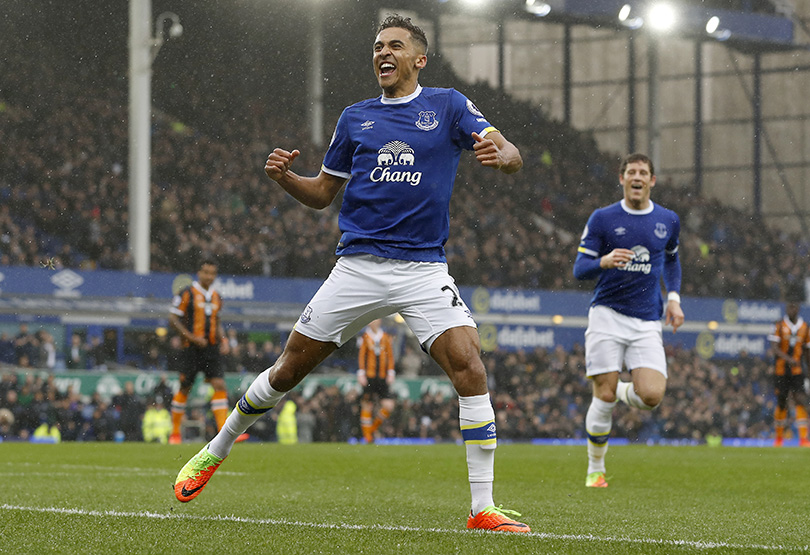
Allardyce was eventually appointed as Everton’s new manager, five weeks after Koeman’s sacking, and Calvert-Lewin set about impressing the new boss.
With Allardyce watching from the stands, he won a penalty in Unsworth’s final game in the dugout – a 4-0 win over West Ham at Goodison Park – that was eventually converted by hat-trick hero Rooney.
He followed that up with a goal and an assist in a 2-0 win over Huddersfield, handing the new manager a perfect start.
Everton are now sitting in mid-table and looking to recover from a torrid start to the season. According to reports, Allardyce is keen to find a replacement for Lukaku during the January transfer window, with Borussia Dortmund’s Pierre-Emerick Aubameyang top of his shopping list.
Calvert-Lewin isn’t fazed, though, and has a mental strength that belies his tender years. “Certain experiences define how you are as a person, and the experiences I’ve had so far have brought me to where I am now,” he says.
“The time I went out on loan in non-league and played men’s football; the times when senior pros at Sheffield United would shout at me for giving the ball away – those times have toughened me up and mentally prepared me for where I am now and the pressure I’m under.”
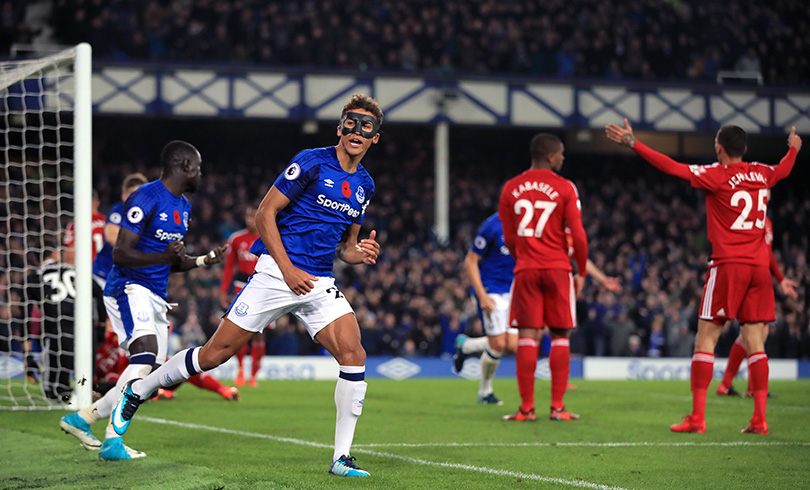
Allardyce likes tough. He likes speed. And he likes strikers who can hold the ball up and get in behind in equal measure. In Calvert-Lewin he has a Kevin Davies-Nicolas Anelka hybrid in the making.
What Calvert-Lewin doesn’t have just yet is their experience, their nous, but he has the self-belief to become Allardyce’s next triggerman.
“With Rom leaving I knew there was going to be an opportunity for me to get more game time in my preferred position,” he says. “I know I can score goals and it’s now down to me to put in the performances and take my chances.”
Having conquered every other challenge in his career, you wouldn’t bet against him.
